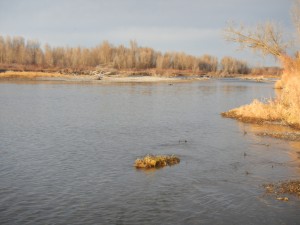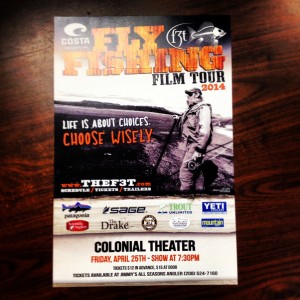
Main Stem Snake River Near Blackfoot
We offered a write-up on the main stem Snake River last year to give some timely thoughts on autumn fishing it offers. It’s time to look at this river again because the early season deserves notice, and that season has limits. So now is the time to consider the main stem between American Falls Reservoir and the Menan Buttes. Best conditions for access would be where ice has left the river edges, and now that is everywhere. Flows throughout are slightly above average now, and water temperatures throughout are in the low forties in degrees F., so let’s talk strategy, dry and wet.
First is dry-fly fishing, and this revolves mainly around the midge life cycle. These make up the bulk of aquatic insects living in the river. The best times for most numerous emerging insects are during low light days without wind ( if that is possible!), however midges emerge during sun-lit days albeit in reduced numbers. Either way, look for them emerging particularly at the heads and tails of riffles and slower waters. Underneath overhead cover is another location, particularly on windy days. Although it is more fun to present dry adult imitations on the surface, emerger patterns fished in the surface film or just underneath is more effective. Drift your pattern of choice down to where fish are rising, then raise your rod tip slightly. This action simulates an emerger rising to the surface, and it is sure to attract more attention than just drifting a fly through active fish. It’s the old Leisenring lift that has been around for so many decades. When the river warms up a bit more, look for BWOs to begin emerging up and down the river. Hopefully that will happen before irrigation demands interfere.
Now for some thoughts on wet fly fishing. Nymphing can be effective with rubberleg, and bead head versions of just about any nymph. Present them on a floating line in riffles and shallows or on a sink tip line in deeper water. Keep the line tight in order to feel the strike or use an indicator to visualize the strike. A compromise between the two techniques is to place a backing section, a couple of feet long, of color (i.e.thirty-pound test in orange, pink, or yellow) contrasting that of fly line being used between leader and fly line and watch any movement of this. Some advocates go so far as to use a waterproof pen to add black stripes to this section. Nymphing may be furn, but streamer fishing can be more exciting. Patterns are not as important as presentation, but woolly bugger types and various streamers are effective. Some folks advocate variations of salt water patterns! Presentation means not only where to place patterns, but when to do so. Low light conditions are always the best time for streamer fishing. Low light means more overhead cover, so early mornings and evenings, or overcast days are most likely time when large fish will take the chance for safe forage. Concentrate on the side of the river out of direct light. Look for overhanging cover, sheltering subsurface structure and drop-offs. Begin at heads of pools and runs. Sweep your fly through or jig it a number of times. If nothing shows interest, go downstream a short distance and repeat your presentation. Continue this method through the run or hole to its end. A short (few feet) stout leader helps in getting to depth, but if you prefer to present in shallow water even a floating line can present effectively.
Access locations are too numerous to discuss here. From Menan Buttes to the reservoir the are literally several dozen of walk-in locations, and many choices for float fishing. The best way to make a selection is to visit the shop and discuss locations with us. We try to keep tuned to what is happening on the river. Flows will not remain in the near ideal situation as now. Not too far in the future downstream irrigation will begin and increase flows substantially. This will move fly-fishing to the “back burner.” So now is a good time to enjoy fishing the main stem.


